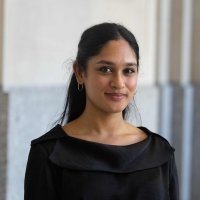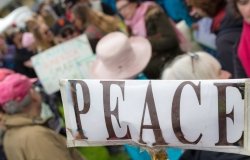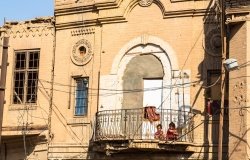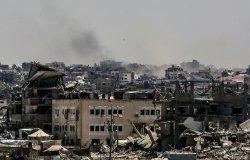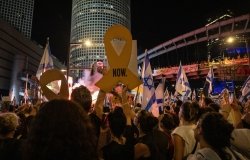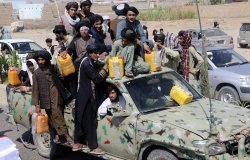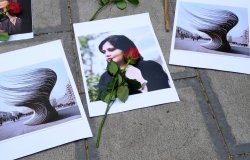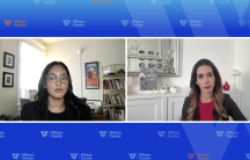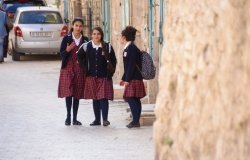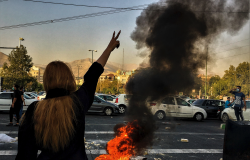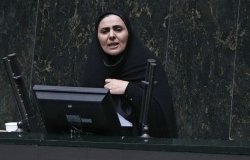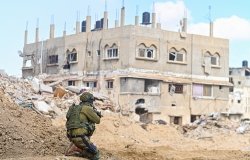Voices of Women from the Middle East: Enheduanna Blog Celebrates 5th Anniversary
In this edition of Wilson Center NOW, we highlight the 5th anniversary of the Middle East Program's blog, Enheduanna with Merissa Khurma and Faria Nasruddin. The blog seeks to“inspire diverse women contributors from the Middle East to voice their thoughts and express their ideas about the state of women in their countries and their often ignored yet important work to advance women’s issues across the region.”
EPISODE TRANSCRIPT
Voices of Women from the Middle East: Enheduanna Blog Celebrates 5th Anniversary
This is an unedited transcript
Hello, I'm John Milewski. Welcome to Wilson Center. Now a production of the Woodrow Wilson International Center for Scholars.
My guests today are Merissa Khurma. Merissa is director of the Wilson Center's Middle East program and Faria Nasruddin who is a program associate with that same program where she serves as Project Lead for the Middle East Women's Initiative. I want to welcome to both of you. Thanks for joining us. Thank you. And so today, as you know, we're celebrating an anniversary.
It was five years ago that you and I discussed on this program. Merissa, the launch of your new blog and want to blog. And so before we dig into how the five years have gone and what the current topics are, what are the take us back. Talk to us about why the blog was established, what its goal is, and give people who don't know the historical basis for the name.
Thank you, John. I cannot believe it's been five years, but here we are today. When when I first joined the Wilson Center, we were working to basically resurrect a lot of the work that MEP founder Haleh Esfandiari had already done on women's rights and women's issues across the Middle East and North Africa region. And there were no blogs linked to the Middle East program.
And the goal was really to give a platform to the various and diverse voices of women in the region to write about all the different issues that they are working on. So this is not solely a blog platform to talk about women's rights or the challenges facing women, but rather bringing expertise from all the different voices of women across the MENA region.And and I chose Anna Dona as the name because another one I was the first and author in the world. She was a poet, a high priestess in Mesopotamia. And I thought it was very befitting that the first penned author was not just female, but also came from the region. So with that, I hope that we also introduced a lot of people to a nugget from history that sometimes, you know, passes us by when when we read about the region.
And I'm very proud to say that we've had over 180 contributors from across the MENA region. All the countries that we work work on and work with, from Iran to the east to Algeria to to the west, Algeria, Morocco. So I think that it's been a wonderful five years. I've learned a lot from so many of the contributors that we've had.
And the topics were also very diverse, from climate change to female labor participation to digitization and technology and and security. So we were very fortunate to have had this diversity not only from the, you know, from the various countries, but also the issues and the expertise. Well, Marissa, congratulations on how successful it's been and all the people you've been able to bring to the table and the name choices inspired.
Right. It's so iconic. It's almost mythological in its power. So I really appreciate that. Well, Maria, before we we talk more about the blog, tell us about the initiative that that you manage as person at the Middle East program. Yes. So as Marissa mentioned and had what is in essence, the flagship publication of this initiative. But other than that, the initiative produces the Esfandiari Forum, similarly bringing voices both from the region and in to D.C. policy circles, and also women leaders in D.C. policy circles together to really discuss the issues facing the region and women in particular, women in the region.Today. Our last discussion was with Ambassador Paula Dobriansky, who was in conversation with Marissa on women and girls in Afghanistan. In essence, what is their position already today? What can the U.S. do to support them? And we're really reviewing the last two years for women and girls. And this is just one of the many subjects that we're touching upon right now.
So the initiative sort of in this iteration will be focusing both on that, on the women's rights aspects of things. But moving forward, similar to the original mission of in Adana, is not only bringing that to the table, but also other issues that women might be grappling with, whether that be climate change, labor force participation or even peacebuilding in peacemaking, whether that's related to directly to women's rights or just the conditions in which women are living currently.
And, you know, both of you have mentioned our dear friend and colleague Holiday Esfandiari, speaking of iconic or almost legendary. And I want to plug, you know, if those of you want to go back and look at the archive of Wilson Center now and of the Middle East program, you can find lots of programing with Holly. And I particularly recommend some of the interviews I did with her over the years about her book My Prison, My Home, which tells the story of her imprisonment in Iran.
But back to the blog and the three. I want to ask you about a piece you wrote to kick off International Women's Day. And we're recording this program during Women's History Month. Tell us about what you wrote about in that piece. Absolutely. So the International Women's Day focused on a overarching theme of investing in women with a variety of subthemes, namely ending poverty, gender responsive budgeting, shifting to a green and care economy, and supporting feminist changemakers overall.
And so the editorial broke down these subthemes from a MENA region perspective. And so we were writing about the feminization of poverty. One of the MVP interns wrote about poverty in Tunisia and how women are after COVID continuing to face this issue and what steps are being a done on the entrepreneurial side to help support women and also what steps need to be taken?
Where should research be focusing? In particular, she spoke about food security, among other issues. I then focused on the shift to the green and care economy. And so after COP 28, there has been a massive push to open up opportunities for women as the MENA region and really across the globe are establishing new sectors in clean energy. And so this is a great window of opportunity, but part of what the editorial is getting at is that just opening these opportunities isn't necessarily enough, that it needs to be coupled with real structural change to make economies work for women, to eliminate eliminate barriers for women's access to these opportunities, whether that be structural change, accounting forcare work, whether that be shifting educational systems to better prep for workforce skills, amongst others. And then the last topic that we covered underneath International Women's Day themes was supporting feminist changemakers. And so we looked at how women at the grassroots level are implementing different strategies to help facilitate women's entry into the economy and participation in society at large.
And so we covered some of the blogs that were written recently. One from Turkey, for instance, that was looking at how to shift world culture in Turkey's tech sector and entrepreneurial sector, how women are supporting each other in this industry all the way to solo. Mahfouz wrote a piece on Education for Women and how to change the mindset from educating women will facilitate a nation to educating women needs to be done for their own sake and self-improvement.
So, you know, supporting feminist changemakers in that sense spans a broad spectrum of tactics and strategies. Marissa had an impressive range of topics and a deep roster of contributors. Give us a little behind the scenes look of how you go about making decisions, editorial decisions on what's coming next. Well, thank you, John. I I'll tell you about how we've done things so far, and then I'll pass this over also to Faria, because part of our goal is not only to expand the network of different women contributors, contributors from the region, but also to to do things a little bit differently and attract a larger audience.
So for us, when we first started, it was really trying to highlight the theme Women and Leadership. And when I reached out to various women leaders in the region, I wasn't solely reaching out to women ministers or parliamentarians because these people have positions of authority. But I really came to this with a mindset that you can exercise leadership, leadership as a practice from wherever you are.
You could be in civil society and lead communities and families and and organizations and do a lot of valuable work And a lot of the work in the social sector, in particular across the entire region, is primarily led by women. Or challenging stereotypes and pushing the envelope on a daily basis at these local levels. And it's very, very important.
So then we started diversifying a little bit more and expanding the topics in the networks to also include other women who are focused on some of the themes that we were working on here at the Wilson Center as Middle East program from workforce development to the digital economy to peace and security, gender based violence, as well as what Faria mentioned climate change and forced displacement.
So it was very much driven by the different themes that we were working on, but we also meet so many people at conferences and, you know, some of them hosted here at the Wilson Center, some of them also in the region. And you know, as soon as I get a sense from, you know, a female activist or entrepreneur that there's a story there, I automatically invite them to contribute.
And and I think I don't think we've had any people decline so far, which is a great sign.
So I'm guessing, Marissa, that not only are people not declining, but that they're also beginning to volunteer.
Yes, we've had a few a few writers who actually came back to us and said, I, I have this in mind. And I pitched this idea and I'm very grateful to that because they come to us knowing that this is a platform that will welcome their ideas, their expertise. And for us, it just highlights the diversity across the region.
But for real. Marissa did an artful segway there to you, and then I stepped on it. But now over to you. No, absolutely. So, I mean, we're similarly using, you know, and building on on the work that Marissa has already done, reaching out to contributors who work on the issues that that we're really we're tracking it. MEP that stayed the same, but we're one initiative that we're particularly excited about is the rising voices women speak from MENA that we're doing in partnership with the news agency.
More to Her story. This is taking a slightly different approach since it's a bit more of a journalistic lens. We're partnering with this new great news agency to similarly attract and attract voices and stories that wouldn't necessarily reach this audience otherwise. So far, we've done a piece similarly on Afghanistan. We're doing a lot of pieces on Gaza and a lot more areas that we wouldn't necessarily have the connections to get to without this news agency there.
And so that is something we're working on, on continuing and expanding, taking a slightly different genre approach, but similarly valuable and and well needed. Thanks. Reza, I want to ask you, you know, I know this is an overly broad question, and I apologize for that. But using the five years of the blog as a demarcation point, have things since you launched improved for women in the region, stabilize, went, gone backwards?
You know, we have this Israel-Hamas conflict and other disruptions. The whole world seems to be on fire on any given day. What are the circumstances? How are they trending? That's a really good question. So I think overall we're seeing some incremental progress across the board. So if you're looking at the data that just brings together all the different countries together, then there is significant progress when it comes to education, health and workforce participation, I would say less so on the political participation at points.
However, there are variations across the region and that's that's another key point to highlight that the MENA region shares a lot, including some of the challenges that women face. But, you know, each country has its own set of local sets of challenges as well as progress reports. And I think that the countries that have really made very significant strides in the last five years, in particular when it comes to female labor participation, women in leadership, even closing the gender pay gap are primarily in the in the GC see the countries of the of the Gulf Cooperation Council.
So Saudi Arabia, for example, where we've seen female labor participation skyrocket, you know, to to to 40% from about 15 to 20%, that's a very significant increase in a very short period of time. Similarly, in countries like Bahrain that we highlighted in our Women and Entrepreneurship report and the United Arab Emirates, Qatar. So a lot of these countries have seen significant progress.
Unfortunately, the conflicts and the and the the frozen conflicts and resolve conflicts, including, for example, in Syria and the forced displacement crises that they have produced, brings a new set of challenges. So with Syrian refugee populations in Jordan, Turkey and Lebanon, the rates of girls attending schools have plummeted significantly. And that, you know, we've seen the rise of child marriages as well.
So those are all unfortunately crises of the conditions on the ground. And, you know, zooming into the Hamas Israel war currently, you know, there was a new component that was injected into the Palestinian-Israeli conflict that we've also highlighted on another one, which is sexual violence. And there are UN reports that have, you know, basically pointed to to the use of sexual violence.
And then you see how this is this conflict is impacting girls and women in Gaza and the humanitarian catastrophe that has unfolded there. And so there are really very, you know, very different pictures across the region. And it's sometimes it's unfair to say, well, the region is, you know, overall doing really well because there are really stark differences across the board.
You know, sort of free along the same lines as Marissa was. She was talking about the unevenness across the region and progress where it's happening. But regression where it's not. Well, what about young people within the region, young women in particular? Are we seeing a different set of expectations among young people? And is that beginning to gain any traction culturally or politically?
I would similarly echo Marissa's comments and that you're seeing quite stark differences across the region when it comes to young people. I mean, you see, for instance, Iran and young people and young women in particular lead it, you know, two years ago leading the mass mini protests. And that in that sense, you see young people being quite empowered across the region, empowered to speak out, empowered to change things.
But then you see stark contrast when it comes to Syria, as Marissa mentioned, and the displacement conflict in which young women in particular, women are heavily impacted by that. And so that stark contrast is similarly reflected amongst young people, and it would be difficult to paint it with a broad brush to say that overall young people are more empowered to initiate change, to speak out, because in some places in the region, the circumstances just aren't necessarily pointing to that.
But the momentum is is still present and is there in pockets. Thanks. Before we close, I want to give each of you an opportunity for a final thought. You've been generous in answering my questions, but there may be some things I haven't brought up that you think are worth mentioning. And so let's begin in the order of introduction, Marissa.
Any final thoughts? So I think the one thing to keep in mind is that change is taking place. It's not linear, and we have to have the strategic patience to see through with some of the positive changes, but also to understand the setbacks because there are external factors that sometimes we cannot control. But I am very proud of what Erdogan has done, and I look forward to the next five years to see how it's going to change in the next five years.
When we look back, you know, ten years from five years from now. I just hope it goes slower than those first five have gone. We've got to slow this thing down too fast. Faria, you get the final thought. thank you. I would say that I'm also excited about the change that is happening. It's similarly, as Mirza said, it's not linear moral, you know, building on that, I'm excited to see how change will differ from how change has happened in other places in the world.
I think women in the region are really forging their own paths and new forging new identities for themselves, forging new norms. And I think that that will create really lasting change. And I think it's very exciting, exciting to see, although sometimes difficult to endure. Well, thanks to both of you. Congratulations again on on the fifth anniversary. That and I want to tell our viewers and listeners, if you just come to the website Wilson Center, Morgan, you'll find the programs tab.
Go to the Middle East program. The resources we're talking about today and many others are available to you because our guests aren't just writing and talking about women's leadership. They are walking the walk and talking the talk. So thanks to both of you. Congratulations on this milestone. Thank you. We hope you enjoyed this edition of Wilson Center now and that you'll join us again soon.Until then, for all of us at the center, I'm John Milewski. Thank you for your time and interest.
Guests
Hosted By

Middle East Program
The Wilson Center’s Middle East Program serves as a crucial resource for the policymaking community and beyond, providing analyses and research that helps inform US foreign policymaking, stimulates public debate, and expands knowledge about issues in the wider Middle East and North Africa (MENA) region. Read more

Middle East Women's Initiative
The Middle East Women's Initiative (MEWI) promotes the empowerment of women in the region through an open and inclusive dialogue with women leaders from the Middle East and continuous research. Read more



